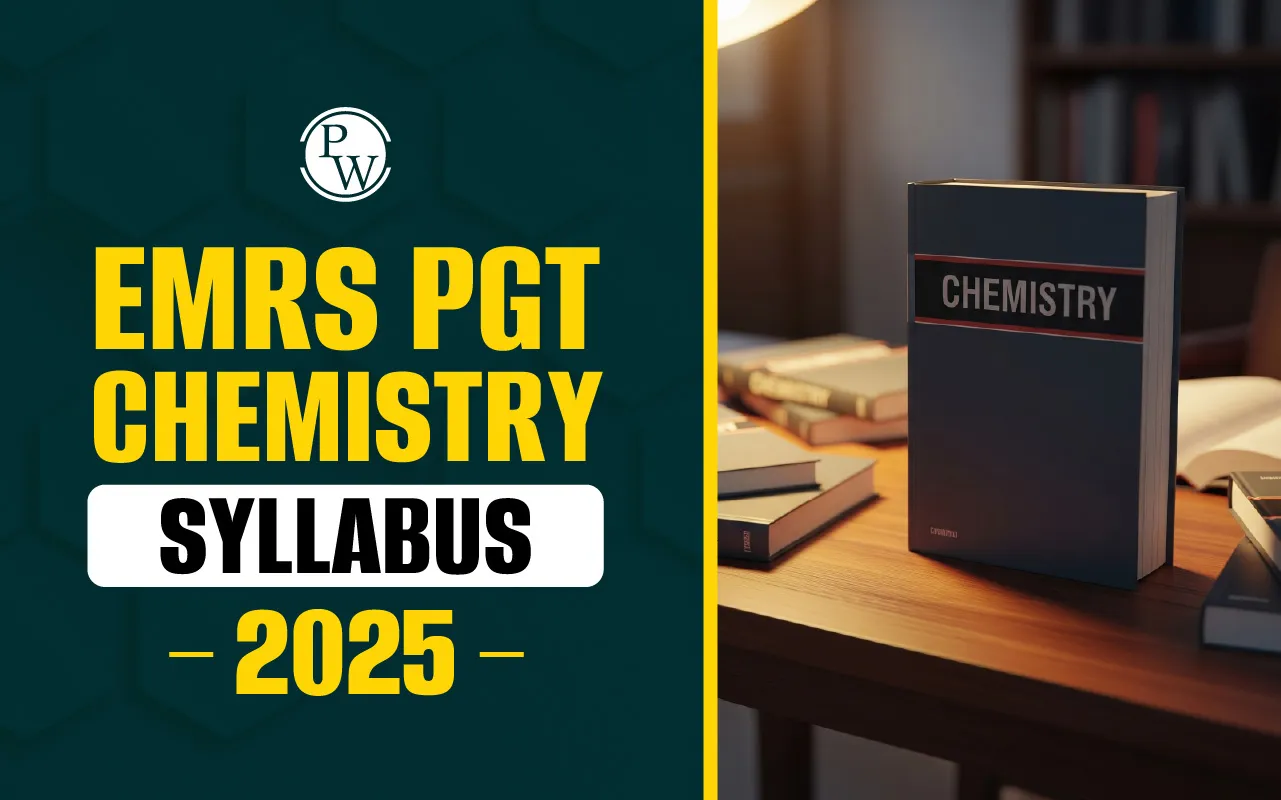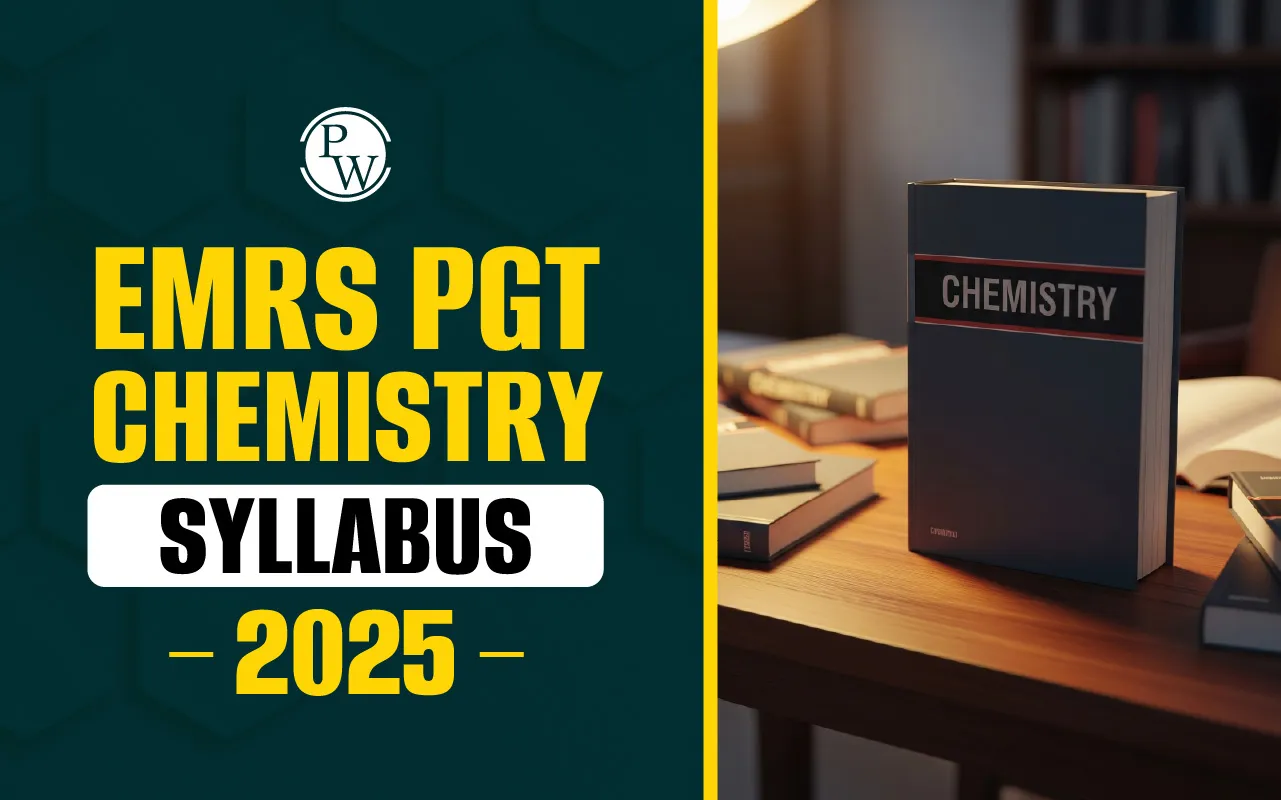

EMRS PGT Chemistry Syllabus 2025: The examination for the Post Graduate Teacher (PGT) position in Eklavya Model Residential Schools (EMRS) is a significant opportunity for teaching aspirants. Proper preparation begins with a thorough understanding of the syllabus. The EMRS PGT Chemistry Syllabus 2025 is designed to test the candidate's deep knowledge of Chemistry, along with their general aptitude and teaching skills. Candidates preparing for this competitive examination must carefully study all parts of the syllabus to achieve a high score.
EMRS PGT Chemistry Syllabus 2025 Overview
The EMRS PGT examination is generally conducted in two tiers: a Preliminary (Tier-I) and a Subject Knowledge (Tier-II) test, which includes both objective and descriptive questions. For the PGT Chemistry post, the syllabus is divided into general sections and a subject-specific section. The overall structure and weightage are summarised below.
| EMRS PGT Chemistry Syllabus 2025 Overview | |
| Conducting Body | National Education Society for Tribal Students (NESTS) |
| Post Name | Post Graduate Teacher (PGT) Chemistry |
| Examination Mode | OMR-Based/Online (Generally) |
| Total Parts in Exam | General Paper + Subject-Specific Paper |
| Negative Marking | 0.25 mark deduction for each wrong answer |
| Total Duration (Tier-I) | 2.5 hours |
| Total Duration (Tier-II) | 3 hours |
EMRS PGT Chemistry Syllabus PDF
The detailed EMRS PGT Chemistry Syllabus PDF is essential for structured preparation. The official syllabus PDF can be downloaded directly from the official website of the National Education Society for Tribal Students (NESTS). Students must access this document to get the authoritative list of topics covered in the EMRS PGT Syllabus 2025.
EMRS PGT Chemistry Syllabus 2025 (Topics Wise)
EMRS PGT Chemistry Syllabus 2025 Topics have been compiled for the candidates in the table. Candidates can check the syllabus topics for exam preparation. Focus on solving the questions and work on the conceptual understanding.
| EMRS PGT Chemistry Syllabus 2025 Topics | |
| Unit/Chapter | Key Topics Included in the Syllabus |
| I. Physical Chemistry | Basic concepts of Chemistry, Structure of Atom, States of Matter (Gases and Liquids), Chemical Thermodynamics, Equilibrium, Redox Reactions, Solutions, Chemical Kinetics. |
| II. Inorganic Chemistry | Classification of Elements and Periodicity in Properties, Chemical Bonding and Molecular Structure, s-Block Elements, p-Block Elements, d and f-Block Elements, Co-ordination Compounds. |
| III. Organic Chemistry | Purification and Characterisation of Organic Compounds, Hydrocarbons, Haloalkanes and Haloarenes, Alcohols, Phenols and Ethers, Aldehydes, Ketones and Carboxylic Acids, Organic Compounds containing Nitrogen, Biomolecules, Polymers. |
| IV. Other Sections (Tier-I) | General Awareness, Reasoning Ability, Knowledge of ICT, Teaching Aptitude, National Education Policy (NEP) 2020, and Language Competency. |
EMRS PGT Chemistry Exam Pattern 2025
EMRS PGT Chemistry Exam Pattern 2025 has been compiled in a table format. Candidates should know that the merit list will be prepared based on the marks of Part I to V. The Chemistry section covers 80 questions of 80 marks. There is a negative marking of 0.25 marks in the exam.
|
EMRS PGT Chemistry Exam Pattern 2025 |
|||
|
Part |
Component/Subject |
Questions |
Marks |
|
I |
General Awareness |
10 |
10 |
|
II |
Reasoning Ability |
15 |
15 |
|
III |
Knowledge of ICT |
15 |
15 |
|
IV |
Teaching Aptitude |
30 |
30 |
|
V |
Domain Knowledge (Subject-Specific Chemistry) |
80 |
80 |
|
VI |
Language Competency Test (General English & Hindi) - Qualifying |
20 |
20 |
|
Total |
170 |
170 |
|
|
Tier-I Total (Merit) |
(Parts I to V) |
150 |
150 |
|
Negative Marking |
0.25 Mark per incorrect answer |
||
EMRS PGT Chemistry Preparation Tips
Candidates who have applied for the EMRS PGT Recruitment 2025. They should carefully review the EMRS PGT Syllabus 2025 along with the exam pattern. It can help the candidates to make a preparation plan and study for the exam.
-
Understand Fundamentals: Start with a clear review of Class XI and XII Chemistry textbooks. Strong conceptual clarity is necessary for the advanced questions asked in the PGT exam.
-
Practice Numerical Problems: Chemistry requires solving numerical questions, especially in Physical Chemistry topics like Thermodynamics, Kinetics, and Solutions. Practice a variety of problems regularly.
-
Focus on NEP and Teaching Aptitude: These sections are compulsory. Candidates should study the principles of the National Education Policy 2020 and basic pedagogy extensively.
-
Solve Previous Papers: Solving past year question papers helps candidates understand the difficulty level and the nature of questions, including objective and descriptive types.
-
Revise Regularly: Chemistry involves numerous reactions, mechanisms, and theories. Frequent revision of organic reaction mechanisms and inorganic naming conventions is crucial.
